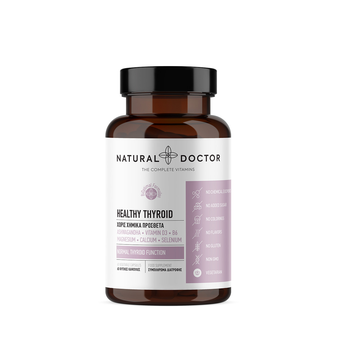Thyroid triumph: overcoming deficiencies for peak performance

Nutritional deficiencies can seriously influence thyroid function, as many essential nutrients play crucial roles in thyroid hormone synthesis, conversion, and regulation.
Here's a closer look at some essential nutrients and their relationship to thyroid health:
Alpha lipoic acid
ALA may help support the production of thyroid hormones, including thyroxine (T4) and triiodothyronine (T3). Thyroid hormones play a crucial role in regulating metabolism, energy production, and overall body function.
By supporting thyroid hormone synthesis, ALA helps maintain optimal metabolic function and energy levels.
Selenium
Selenium is a vital mineral that functions as a cofactor for enzymes that convert thyroxine (T4) to triiodothyronine (T3), the active form of thyroid hormone. Selenium supports the thyroid gland and helps to protect it from oxidative stress and inflammation.
Selenium deficiency is associated with thyroid disorders, including autoimmune thyroid conditions like Hashimoto's thyroiditis and Graves' disease.
Zinc
Zinc is vital in thyroid hormone production and regulation and synthesizing thyroid-stimulating hormone (TSH). Zinc deficiency can impair thyroid function and contribute to hypothyroidism.
Additionally, zinc is involved in immune function and may help modulate autoimmune responses in thyroid disorders.
Zinc deficiency can affect thyroid function by affecting thyroid hormone synthesis and metabolism. Iron is essential for the enzyme thyroid peroxidase (TPO), which is involved in the production of thyroid hormones.
Low zinc levels can lead to decreased TPO activity and impaired thyroid hormone production, contributing to hypothyroidism.
Vitamin D
Vitamin D receptors are present in thyroid cells, indicating a role for vitamin D in thyroid function. Adequate vitamin D levels are associated with improved thyroid function and reduced risk of autoimmune thyroid diseases.
Vitamin D deficiency, on the other hand, is linked to autoimmune thyroid disorders and suboptimal thyroid function.
B Vitamins
B vitamins, including B6, B12, and folate, are involved in various metabolic processes related to thyroid hormone synthesis and regulation. Deficiencies in these vitamins can disrupt thyroid function and contribute to conditions like hypothyroidism and hyperthyroidism.
Magnesium
Magnesium is required to convert inactive T4 to active T3 thyroid hormone. It also plays a role in cellular energy production and may help mitigate the effects of stress on thyroid function.
Magnesium deficiency has been associated with thyroid dysfunction and may exacerbate symptoms of thyroid disorders.
Ashwagandha
Ashwagandha, often known as the "Indian Ginseng," has been used for centuries in Ayurvedic medicine for its adaptogenic properties.
Studies have shown that Ashwagandha can balance cortisol levels, reduce stress, and support thyroid function by enhancing the conversion of T4 to the active T3 hormone.
Its inclusion in thyroid support formulations enhances resilience to stressors, a critical factor in thyroid health.
Cinnamon Bark Extract
Beyond its delightful aroma and flavor, cinnamon bark extract holds promise for thyroid health. Rich in antioxidants, it helps to control oxidative stress, which can impair thyroid function.
Additionally, cinnamon improves insulin sensitivity, which is crucial for managing conditions like Hashimoto's thyroiditis. Its synergistic effects with other compounds further enhance its thyroid-supportive properties.
Amino Acids: L-Tyrosine and L-Glutamine
L-tyrosine and L-glutamine are amino acids essential for thyroid hormone synthesis. L-tyrosine serves as a precursor for thyroid hormones, while L-glutamine plays a role in maintaining gut health and supporting immune function.
This combination supports the body's natural production of thyroid hormones by providing these building blocks, promoting optimal metabolic function and energy levels.
When necessary, addressing nutritional deficiencies through dietary changes and supplementation can support optimal thyroid function and overall health.
In conclusion, recognizing the deep influence of nutrient deficiencies on thyroid function underscores the importance of prioritizing optimal nutrition for our overall well-being.
As we navigate the sophistication of thyroid health, we should remain alert in addressing and correcting any deficiencies through conscious dietary choices, supplementation, and professional guidance.
Replenishing our bodies with the essential nutrients they require, we pave the way for restored balance and vitality in our thyroid function.
However, working with your medical doctor to identify deficiencies and develop a personalized supplement plan is essential, as excessive intake of certain nutrients can also adversely affect thyroid function.



